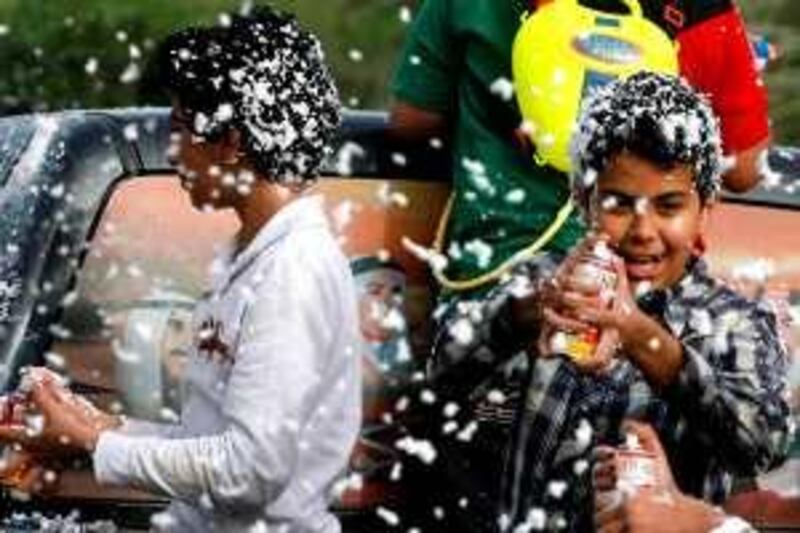As the dust settles after four days of partying in the streets, Kuwaitis are wondering if the dangers that tinge their National Day celebrations - including a foam that hospitalised more than 400 people - are starting to become too much. Kuwait began its celebration for National Day on Thursday and its Liberation Day on Friday with a long weekend off work. Many Kuwaitis, dressed in the national colours, packed into the city's main streets each night to spray each other with foam, play music and perform stunts in their cars.
But on Sunday, the government reported a darker side to partying on crowded roads. Col Mohammed al Saber, the spokesman for the ministry of the interior, said 11 people had been killed in road accidents, and the police had issued 13,821 fines and impounded nearly 800 vehicles. On the same day, the ministry of health's medical emergency department reported that it had dealt with 143 medical emergencies during the celebrations, 46 of whom were hospitalised. Of those that were sent to hospital, 26 had been involved in fights. Battles often start when a reveller sprays someone not so keen, leading the local press to brand the this year's festivities as "the clashes of the foam".
One local newspaper, Al Watan, quoting sources, said a motorbike accident that led to the death of a policeman was caused when the man lost control of his vehicle after being covered by foam from the crowd.
Calls to ban the substance are starting to grow. The Environment Public Authority said the foam should be banned because it causes short and long-term health damage, and Kuwaiti Greenpeace has criticised its use of harmful chemicals.
At Kuwait's ophthalmology hospital, Al Bahar Eye Centre, the staff revealed to The National yesterday the extent of the damage the foam is causing to Kuwaiti eyes. Nadia Sadeq, the head of the ophthalmology council, who has worked in the hospital for 20 years, said 405 people were hospitalised by the spray over the four-day holiday. Dr Sadeq was in the process of preparing a report for the ministry of health that recommends the substance is banned. She said the government should "at least" educate people not to spray each other in the face.
The foam is alkaline, which causes more severe burns than acid, she said. "The injuries ranged from mild irritation, redness of the eye, to having first degree burning of the eyelid - and a scalding of the cornea." The hospital often receives patients with eye injuries around the holiday periods, but during the holidays for Eid, the damage is caused by plastic pellets from toy guns. Dr Sadeq said the types of toys that children use change from year to year and the foam came into fashion several years ago.
Mohammed Ibrahim, 31, a Syrian who works in the hospital's casualty department, registering new patients and chauffeuring them through to the medical staff, said he worked 12-hour shifts starting at 7pm on Thursday and Friday, and he has never been so busy. "The reception was packed to the brim, and hundreds more were waiting to get into the building, we had about 500 patients in a single night, though not all of them were hurt by the foam," Mr Ibrahim said.
"Kids from as young as five years old, right up to men around the same age as me had chemical burns on their eyes. "This was much worse than Eid. Some teenagers had got a hold of the chemicals that women use to remove the hair from their arms, and were throwing it at other people for fun." Dr Sadeq said: "What is happening in the street is totally different than the way most people actually celebrate."
She said schools hold parties with music and songs, children wear the national dress and families decorate their houses with the national colours. Other Kuwaitis decided to get away from the raucous behaviour altogether, and some are resorting to an older, more local form of entertainment: clusters of tents in the desert where families often retreat to on the weekends. "My family and friends and I had quite a different day from those looking for girls, covering their cars with flags and dancing on the Gulf road," said Meshari ben Hajji, 21. "We spent the day in our desert camp and everybody wore something different with the Kuwaiti flag on it: hats, badges and T-shirts.
"We listened to Kuwaiti music and played volleyball with the winners getting medals inscribed with the date and pictures of the Kuwaiti flag. "I'm more anti-foam than anyone else. In my opinion it's ridiculous and people must stop using it and do something else instead. I hope people change the way they celebrate," he said. @Email:jcalderwood@thenational.ae





